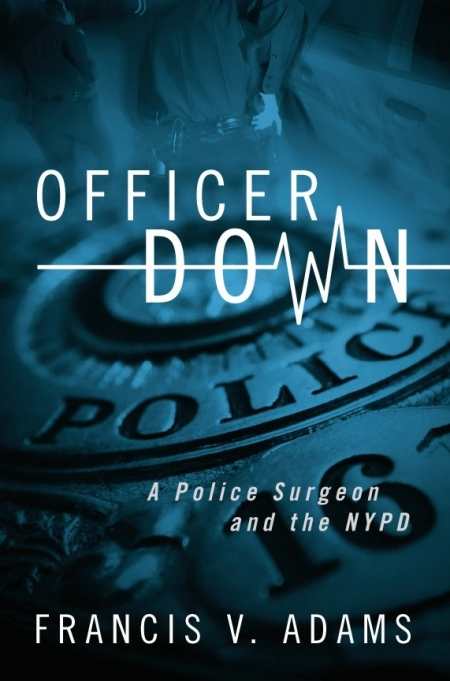Officer Down
A Police Surgeon and the NYPD
Inspired by the tragic events of 9/11 and the potential respiratory health issues faced by NYPD first responders, pulmonologist Francis V. Adams joined the NYC force as a police surgeon. After thirty years in private practice, with no idea what to expect in his new position, Adams took on his new duties and has been learning on the job ever since. In his new book, Officer Down, he shares a number of his experiences and provides an enlightening glimpse into a world that few ever see. From its excellent, informative introduction through the last of its twenty-one short chapters, the book offers unusual insight for the curious and serves as a truly special tribute to the men and women of the NYPD.
Understanding that the American public is unfamiliar with the designation “police surgeon,” Adams begins with a brief but helpful history of the term and a short description of a police surgeon’s duties. He explains that “the role of the surgeon is primarily one of review, rather than hands-on care,” and the job does not involve performing surgery.
As part of the Medical Division of the NYPD, Adams is “responsible for the well-being of police officers,” which in very simple terms involves assessing the treatment of both ill and injured officers, making trauma visits to area hospitals, assisting at the scenes of catastrophic events, and determining if and when service members are fit to return to duty. Any officer who calls in sick for more than forty-eight hours is required to see his or her “district surgeon” before returning to work, so Adams deals not only with job-related injuries, but with a wide range of other cases, as well.
The doctor’s genuine admiration for the members of the NYPD radiates from every tale he relates here. Adams writes so engagingly and with such apparent sincerity that it is difficult not to get involved in his stories. Whether recounting a case of violence resulting in physical injury or describing the psychological implications of having to retire a permanently disabled officer, effectively ending his career, Adams displays great empathy and understanding. His stories are personal and thought provoking. Some are disturbing, all are sobering, but most, including his explanation of the ramifications of having to relieve a heavily medicated or depressed officer of his service weapon, are markedly poignant.
In Officer Down, Adams shares not only his experiences, but also the extent of his personal involvement with his patients’ recoveries. He clearly enjoys what he does, and his stories reflect his satisfaction with helping members of the force return to their duties following their illnesses and injuries. He packs an admirable amount of information and emotion into a very short book and does so in a way that is both fascinating and easy to follow. His tales are topical, touching, concise, and well written, leaving readers with much to ponder and perhaps even a different perspective on the police department and its members.
Reviewed by
Cheryl Hibbard
Disclosure: This article is not an endorsement, but a review. The publisher of this book provided free copies of the book and paid a small fee to have their book reviewed by a professional reviewer. Foreword Reviews and Clarion Reviews make no guarantee that the publisher will receive a positive review. Foreword Magazine, Inc. is disclosing this in accordance with the Federal Trade Commission’s 16 CFR, Part 255.

